The phone company came out and cut over the T-1 circuit on Wednesday, June 2nd. This really kicked things into high gear. By that afternoon we had moved the Prophet systems automation rack up to the new location and started broadcasting from there.
Unfortunately, the backup plan, which was to use the phone company’s DSL circuit to relay audio to the transmitter site, fell through at the very last minute. I think the phone company mistakenly turned off the DSL service to the old studio ahead of schedule. The net result was 2 hours off air in the middle of the day, which we were seriously trying to avoid. Once it was done, however, there was no going back, so we worked extra hard to get back on the air from the new location.
Naturally, while all this is going on, the electrical inspector shows up to do the final electrical inspection for the town building department.
Here is a nice progression on the equipment racks:
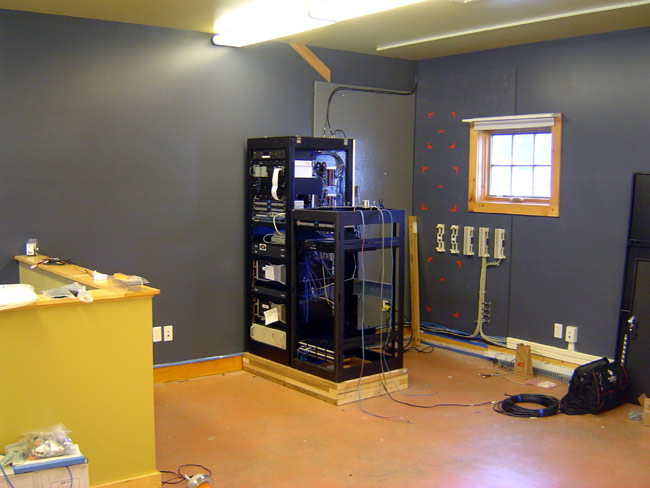
After the T-1 circuit was cut over, we began broadcasting from the new location with the equipment rack automation system using the production room as a studio for live elements and voice tracking.
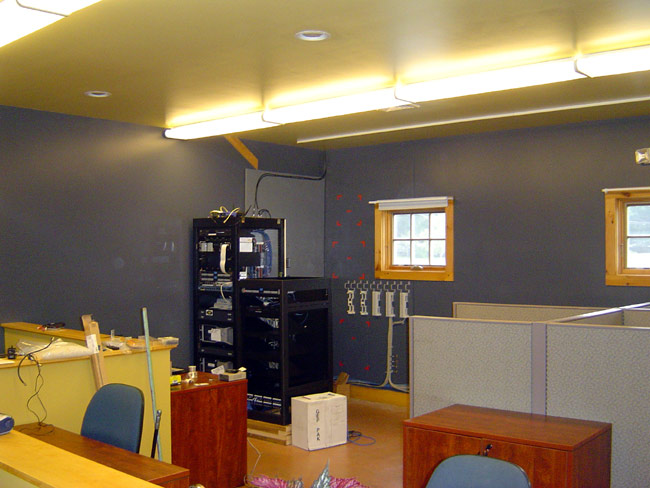
The wiring on the equipment rack is completed.
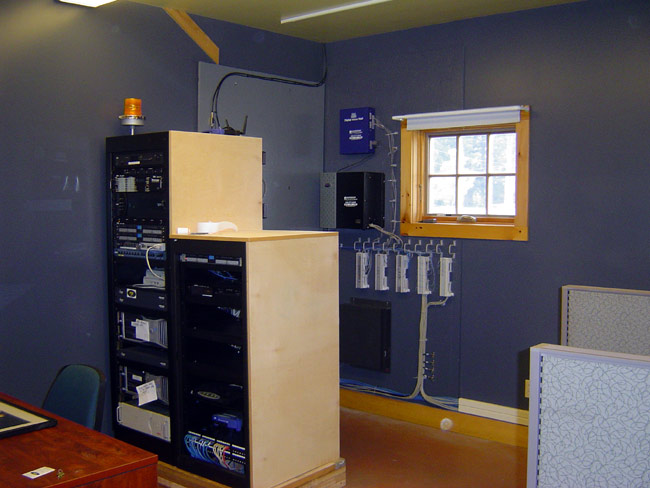
The equipment rack is completed, the phone system is installed, and the computer network is wired and tested. The yellow light on the top of the rack is a silence sensor.
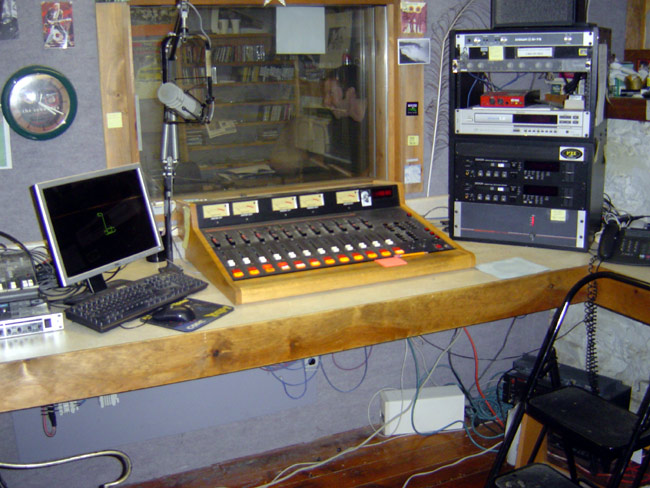
The old WKZE studio was ripped out on Thursday. The console was removed and rebuilt with a new control surface
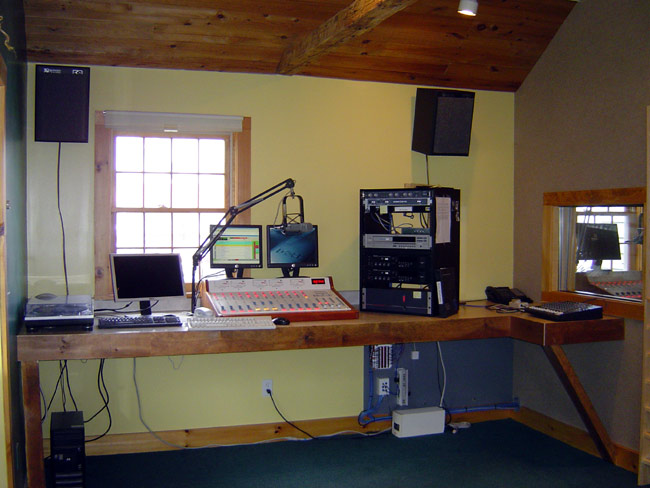
The production room was completed, speakers hung, etc.
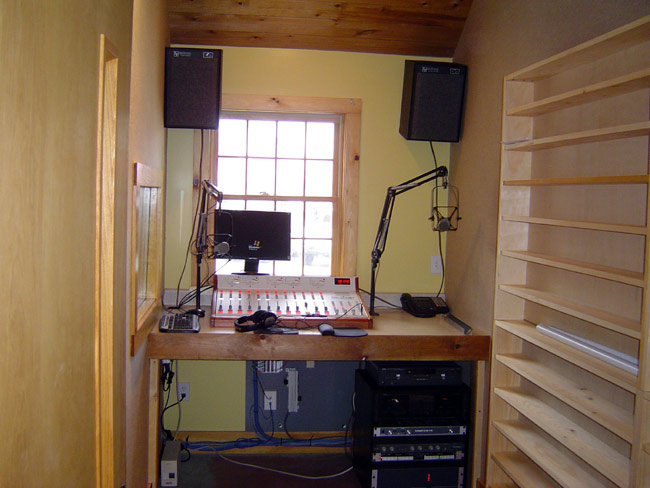
All set and ready to be “customized” by the DJ’s. Monday morning, the staff will roll into their new digs, which is always fun. In comparison to most studio moves and built outs these days, this one was relatively small and simple. The last studio consolidation project involved 5 radio stations and ten studios. That one took place in steps over several months.


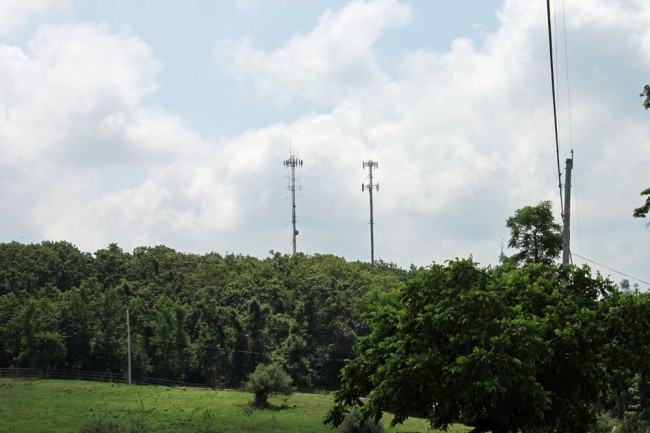
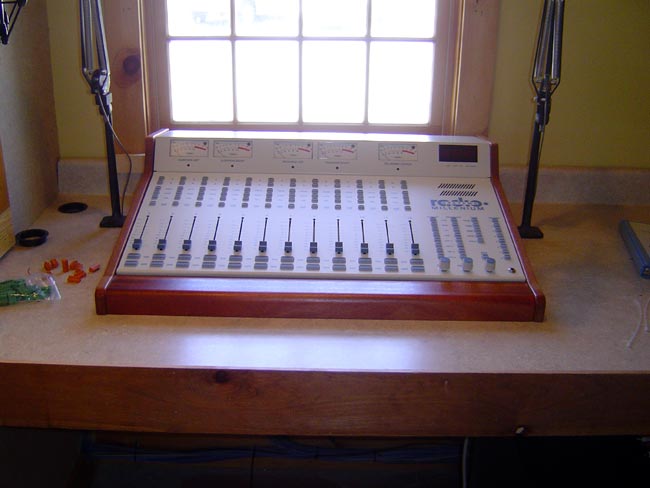
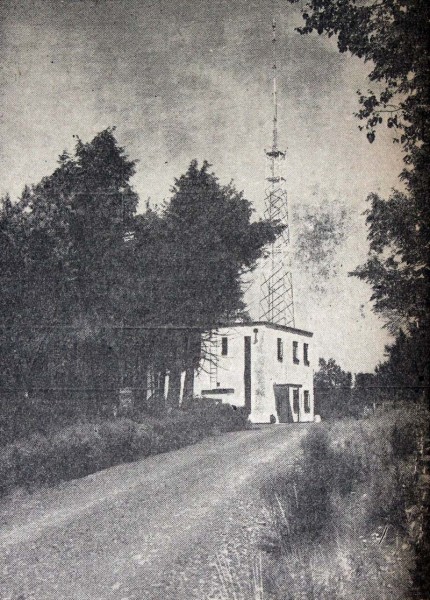

Everything seemed ordinary except when the word “Prophet” came up! A small independent station buying an automation system from Clear Channel? This is just too much!
Actually, I have found Prophet to be one of the better automation systems. There are at least 20-30 non-clear channel stations around here that use Prophet. People like them because they are headquartered just down the road in White Plains. There tech support is top notch with somebody on staff 24/7 (none of this waiting for somebody to return a page). From what I can tell, there is no preferred treatment, they seem to treat every station the same. Just my experience, of course, your millage may vary.
I guess I must be a cheap-skate, because I would never buy one of those high-priced “hold your hand” systems. Scott Systems had a good system but was bought out by goooogle and I have not heard much about it since. A BSI system called “Simian” seems to work well for a fraction of the price, and you can build the system yourself without the “middle-man hardware markup”. There is a Linux based system out there called Rivendell, which was developed by a former engineer at Salem, I am told that it is an excellent, stable system, and most importantly, it is free! Support is only a modest service charge if you aren’t familiar with “Suse-Linux”. Windows based ZARASTUDIO is also a free-be and also seems to work quite well. The way the industry is going, I would be one to thoroughly investigate all automation systems and keep in mind the paramount principle of low cost.
I have to respectfully disagree with you there J. In my experience cheap automation software always ends up biting you on the ass in the end. In radio when your spending so much on hardware and equipment I don’t understand why a lot of people baulk at the idea of paying for software, when the software is what brings it all together.
I was like a kid in a candy shop when automation first came in! We had Wizard for Windows running on Windows 3.1 and it was rock solid (well except for when the talent thought they were computer engineers and played with things they shouldn’t)
I have a good friend who has installed BSI “Simian” which is very low priced and ZARASTUDIO which is free. Simian has been running for years without any “ass-biting” whatsoever. ZARASTUDIO hasn’t been in operation as long, but also hasn’t exhibited any “a-b” either. On the other hand, a French developed product “Dalet”, which is expensive and proved troublesome has been thrown out by two local stations. There is an old saying that I have come to believe; “The best things in life are free”!
I’ve heard some good things about Zara, I am going to set up a copy and run it off line for a month or so and see how it does. BSI is owned by Cumulus, so I guess it is pick your poison. I am not a salesman for Prophet or any such, but I will say, part of what a customer pays for is the software support. WKZE is a true mom and pop operation, they don’t have a huge budget for engineering and try to be pretty self sufficient. With Prophet, anytime the owner or the production guy has a question on how to do something, they call customer service and get an answer right then, no waiting, no call backs, etc. I know with BE Audiovault, there is always a cue and the wait can sometimes be hours if not days. I don’t know how BSI’s customer support is and of course with Zara, you are on your own.
Personally, I am inclined to go with a Linux based system. Windows has so many holes and flaws that it keeps one too busy updating and patching. Rivendell is really good from what I hear, but a knowledge of Linux is a must. Some of the new kids know how to handle it well and it is a solid operating system. Our Asterisk PBX server was built with H-P commercial grade DL380-3 machines for peanuts, and these are premium machines of which many parts are available quite cheap. I happen to like implementing computers to do a task inexpensively, and this adds to the fun of the project. Let all the others throw their money away and buy everything at sticker-plus prices, while I’ll run a solid sounding system with the old stuff and “laugh all the way to the bank”!
I worked on the air at WKZE around 1988 when it was “on the green in Sharon”.
I also did some Engineering There. WKZE was broadcast in beautiful AM stereo, but you couldn’t receive
it at the studio in the evening. I had to switch the board to program. I later worked for WKPE in Orleans, Massachusetts. They were the
previous holders of the WKZE call letters. Interesting coincidence. Nice job on the studio move.
Rivendell automation isn’t the flashiest or most pretty looking, which gains the scorn of some station staff, but It was absolutely the most rock solid automation system I’ve used so far (WideOrbit and Enco DAD being the others I have extensive experience with).I built my system on retired dell poweredge 2850’s and later upgrades to 2950’s. I had no prior linux experience and got it up and running with help from the rivendell mailing list. I did some contract work for a small AM that got their Rivendell system setup with a support contract from Paravel Systems, and later dropped support and went to self support. The first station went out of business, but not because of Rivendell, and the AM is still runing on Rivendell 5 years later. It does everything Wide Orbit and DAD and I’m betting any other system can do. Anyway It’s a great system and IMO not to be lumped in with typical freeware, especially windows stuff. If you can do Linux shell scripting you can pretty much make it do anything.
Hello All,
I am in the process of rebuilding an FM studio using an Alice Air 2000 mixer. I have no past experience working with studios therefore require some help for e.g. any available wiring diagrams to help me figure the connections.
I know the ports for mics, telephone units etc however need an interconnection diagram if available.
Please advise.
Herve